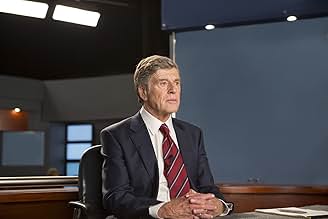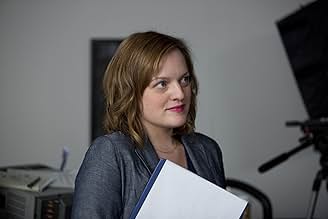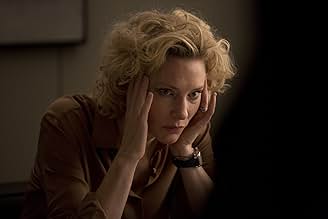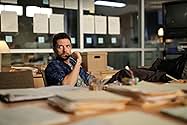Film über die Nachrichtensendung CBS 60 Minutes aus dem Jahr 2004, in der der Militärdienst des damaligen Präsidenten George W. Bush recherchiert wurde, und den darauf folgenden Sturm an Kri... Alles lesenFilm über die Nachrichtensendung CBS 60 Minutes aus dem Jahr 2004, in der der Militärdienst des damaligen Präsidenten George W. Bush recherchiert wurde, und den darauf folgenden Sturm an Kritiken, der die Karrieren des Sprechers Dan Rather und der Produzentin Mary Mapes beendete.Film über die Nachrichtensendung CBS 60 Minutes aus dem Jahr 2004, in der der Militärdienst des damaligen Präsidenten George W. Bush recherchiert wurde, und den darauf folgenden Sturm an Kritiken, der die Karrieren des Sprechers Dan Rather und der Produzentin Mary Mapes beendete.
- Auszeichnungen
- 1 Gewinn & 6 Nominierungen insgesamt
Handlung
WUSSTEST DU SCHON:
- WissenswertesThe movie was shot in Australia at Cate Blanchett's request, as she wanted to be close to her family while filming.
- PatzerThe movie timeline shows June 2004 and Mary Mapes is meeting with Josh Howard and Mary Murphy. She describes Bill White as a "business man" in Houston. Bill White was the MAYOR of Houston. (as of January 2004.)
- Zitate
Mary Mapes: Do you know what it would take to fake these memos?
Dick Hibey: Mary...
Mary Mapes: No, this is important. It would require the forger to have an in-depth knowledge of the 1971 Air Force manual, including rules and regulations and abbreviations. He would have to know Bush's official record front to back to make sure none of these memos conflicted with it. He would have to know all of the players in the Texas Air National Guard at the time, not just their names, but their attitudes, their opinions including how they related to one another. He would have to know that Colonel Killian kept personal memos like this for himself in the first place. He would have to know how Killian felt at the time particularly about his superiors and then First Lieutenant Bush. He would have to know or learn all of this in order to fool us as you assume he did. Now... Do you really think that a man who takes this kind of time and precision, then goes and types these up on Microsoft Word?
[Small pause]
Mary Mapes: Our story was about whether Bush fulfilled his service. Nobody wants to talk about that. They wanna talk about fonts and forgeries and conspiracy theories, because that's what people do these days if they don't like a story. They point and scream. They question your politics, your objectivity, hell, your basic humanity. And they hope to God the truth gets lost in the scrum. And when it is finally over and they have kicked and shouted so loud, we can't even remember what the point was.
- Crazy CreditsWilliam Devane as the voice of Gen. Hodges on the telephone is not listed in the cast.
- VerbindungenFeatured in Close Up with the Hollywood Reporter: Actresses (2016)
- SoundtracksString Quartet #1 - Allegro Assai
Written by Wolfgang Amadeus Mozart (as Wolfgang Mozart)
Courtesy of APM Music
There are multiple messages the film tries to get across. One could be that people in positions of power can get away with certain things pretty easily. Another is that people can take advantage of the chaos that ensues after the outcry of a loud minority on the internet, with the help of other media outlets, to distract from the main story. The main theme, I would say, is that bullies come in all forms, and can be highly destructive.
I think that the film-makers wanted to elicit from their audience opinions about power imbalance and accountability, and maybe even sensationalism. Clearly the other news agencies depicted in the movie were guilty of sensationalist behavior. Perhaps the writers and directors and actors wanted to simply tell a true story about a brilliant journalist who had to struggle very hard to combat the gravity of hyped up nonsense. It was an insult to Mapes' professionalism to have to deal with lame bloggers who weren't accountable to anything (assuming this is even true). Maybe that's the movie's biggest flaw. I don't know what it wanted me to believe. I'm not going to think that Mapes and Rather were innocent just because Quaid whispered a cliché monologue about why they're so compatible with each other (the plane scene).
An original draft of this review had me ranting about the political landscape of 2005. I (sort of?) learned about an important part of American media history. But the focus of the film kept changing. Some themes would come and go while others would resurface in little intervals (three to be exact). For example, the movie started out strong, with high hopes about evidence of the scandal being strong and hard hitting. Then quickly the plot takes a 90-degree turn, and now we're watching Mapes struggling to resolve one measly discrepancy that's grabbing all the media attention. After that disaster subsides, we begin watching a movie about a corporate investigation into false journalism. The storytelling was incoherent, finding myself with unanswered questions as the next big event came.
Most of my questions regarded the documents. The technical military jargon in the dialogue was difficult to follow, adding to the confusion. I found myself repeatedly asking: "who's that guy? Why is he mentioned all of the sudden? John Kerry was a thing back then?" That last question speaks to my ignorance, but still, the dialogue was clunky.
If you watch the film conscious of the underlying theme, it'll be less painful. The theme whose undertones influences all of Mapes' actions is her relationship with her abusive father. She admits at one point that he's the reason she needs to stand up to bullies. And in each of the three stages described above, that is precisely her motivation. First, she "asks questions" about a possibly incriminating aspect of Bush Jr's military history. But what happens? The bully strikes her down. She fights back by proving that the stupid discrepancy wasn't a problem after all. All is good, except now everyone forgot what the story was about. The bully returns with an investigation into her conduct. She didn't do anything inherently wrong (she makes some mistakes though), but she's treated with a disproportionate level of scrutiny. Meanwhile, a man who possibly went AWOL during wartime is winning a presidential election.
When you go to watch the movie, perceive it as a series of acts, like in a play. Act one, the scandal gets out. Act two, the haters launch their attack. Act three, the investigation. On a road which begins with covering the news, and ends with covering your butt, one thing holds; bullies suck.
I'm not watching it again, C grade
Check out our other reviews at http://thefilmlawyers.wordpress.com
- thefilmlawyers
- 2. Nov. 2015
- Permalink
Top-Auswahl
- How long is Truth?Powered by Alexa
Details
- Erscheinungsdatum
- Herkunftsländer
- Offizielle Standorte
- Sprache
- Auch bekannt als
- Truth
- Drehorte
- Produktionsfirmen
- Weitere beteiligte Unternehmen bei IMDbPro anzeigen
Box Office
- Budget
- 9.600.000 $ (geschätzt)
- Bruttoertrag in den USA und Kanada
- 2.541.854 $
- Eröffnungswochenende in den USA und in Kanada
- 66.232 $
- 18. Okt. 2015
- Weltweiter Bruttoertrag
- 5.383.097 $
- Laufzeit2 Stunden 5 Minuten
- Farbe
- Sound-Mix
- Seitenverhältnis
- 2.35 : 1
Zu dieser Seite beitragen































